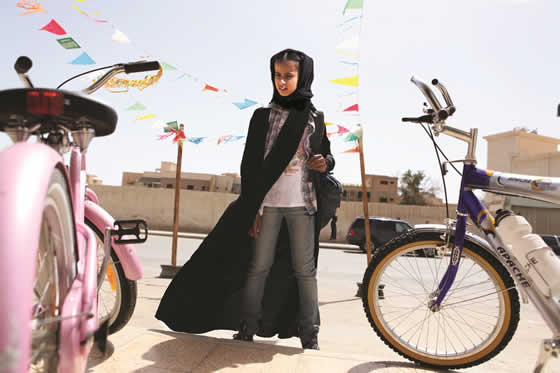 As a 70’s feminist, I have spent hours of the last decade in darkened theatres writhing in agony watching films detailing the oppression of women in fundamentalist societies (“Fill The Void”), religious cults (“Beyond the Hills”) and countless films about Muslim family honor killings. No matter how good the film’s brief is, I sit in impacted rage watching situations I cannot change. For me, these are “horror” films.
As a 70’s feminist, I have spent hours of the last decade in darkened theatres writhing in agony watching films detailing the oppression of women in fundamentalist societies (“Fill The Void”), religious cults (“Beyond the Hills”) and countless films about Muslim family honor killings. No matter how good the film’s brief is, I sit in impacted rage watching situations I cannot change. For me, these are “horror” films.
“Wadjda”, shot by Saudi Arabia’s first female director, is a game changer. The small canvas film, redolent with warm observational touches, has some of the quiet charm of the equally hopeful “Monsieur Lazhar” (2011). Yet it is spirited and subversive, boring from within.
‘Wadjda”, the first feature film entirely made in the Kingdom of Saudi Arabia, was shot by Haifaa Al-Mansour, whose 2005 documentary “Women Without Shadows” (the first Saudi film to win an award in The Kingdom) was a cause célèbre, taking on women’s veils and the Saudi ban on movie theatres. (All public theatres were closed in 1970s after the assassination of King Faisal.)
Haifaa Al-Mansour has managed a careful balancing act. She was allowed to shoot in Riyahd, but directed some scenes by walkie-talkie from a van to avoid angry conservatives in the street, offended by watching a woman give orders to her German and Saudi male crew.
Spunky 11-year old Wadjda lives in a suburb of Riyahd, with her mother (TV star Reem Abdullah). Her father lives nearby in his mother’s family compound, waiting for his second bride. 
She has no patience with her female schoolmates, who join the religious club and dream of marriage. Her best friend is a (forbidden) neighboring boy Abdullah (Abdullrahman Al Gohani), who’s as smitten with her as you will be. She envies Abdullah’s bike and longs to have one (also forbidden) just so she can beat him in a race. Nobody puts Wadjda in a corner.
Wadjda sees the bike of her dreams, tied to the back of a car, driving past, deus ex machina, on its way to the local toy store.
The resourceful kid finds sneaky ways (including petty swindles) to raise money to buy the glorious bike. Eventually, the school tomboy joins the religious club, fooling her teachers with her presumed docility, just to win the coveted Koran Contest prize money.
Wadjda (the insouciant Waad Mohammed) is a resilient rebel. The pint size cynic suffers no fools, watches the oppressed women in dismay, dotes on her absentee father (Sultan Al Assaf) but begins to realize her own oppression when she pins her name to his “Illustrous” family tree, and discovers it crumpled nearby the next day. Daughters don’t count, and her father soon marries again to beget a son.
Wadjda’s aggravated by her mother’s traditional ways and superstitions, her thankless devotion to Wadjda’s father, but wildly protective. In one rooftop scene between mother and daughter, the pair spy on a male election party across the way. They spot Wadjda’s dad. He looks up and they crouch, hugging, united in a one of the daily ways women evade the strict limitations of their life.
Wadjda’s whole life is spent pushing the limits of her life. She’s rigged an antenna to capture western music and makes mix tapes for sale or barter. She manufacturers bracelets to support the local football team, selling them at school. Even this is forbidden, and the girls hide the bracelets under their long black robes. She wears torn high-tops instead of the proscribed black Mary Janes, and she talks back to men.
 In Saudi Arabia, women cannot leave the house without a male guardian. When her mother’s driver (hired to drive her to her distant teaching job) becomes abusive, it’s Wadjda who puts him in his place. Because Wadjda’s appropriated a covert Western style, we’re more shocked by what she has to put up with. Like Marjane in “Persepolis”, Wajda’s irrepressible.
In Saudi Arabia, women cannot leave the house without a male guardian. When her mother’s driver (hired to drive her to her distant teaching job) becomes abusive, it’s Wadjda who puts him in his place. Because Wadjda’s appropriated a covert Western style, we’re more shocked by what she has to put up with. Like Marjane in “Persepolis”, Wajda’s irrepressible.
And what a performance. Screen novice Waad Mohammed gets under our skin. Vibrant, creative, mischievous, she glides between emotions in ways older actors might envy.
In her quiet observational style, Al-Mansour takes us into the heart of Saudi women’s lives: the all girl classrooms, the proscriptions against women driving or working with men in the workplace, the very young girls married off.
The specter of the religious police hangs like a pall, but worse is watching the internal policing performed by women under patriarchal Wahhabi Sharia law.
The film is full of toxic one liners: “A girl who rides a bike cannot have children.” “Women’s voices must not be heard by men, their voices are their nudity.” At prayer, the hypocritical headmistress Ms. Hussa (Ahd) counsels the girls to squeeze close to “leave no space for Satan to squeeze in” and Wadjda is warned to close the Quran Koran she’s been studying for the all important Koran contest, lest Satan spit in it.
Along the way, Wadja’s one-person revolution changes both Abdullah and her mother. And it’s this that gives the film its loft and this viewer hope. A MUST SEE.

